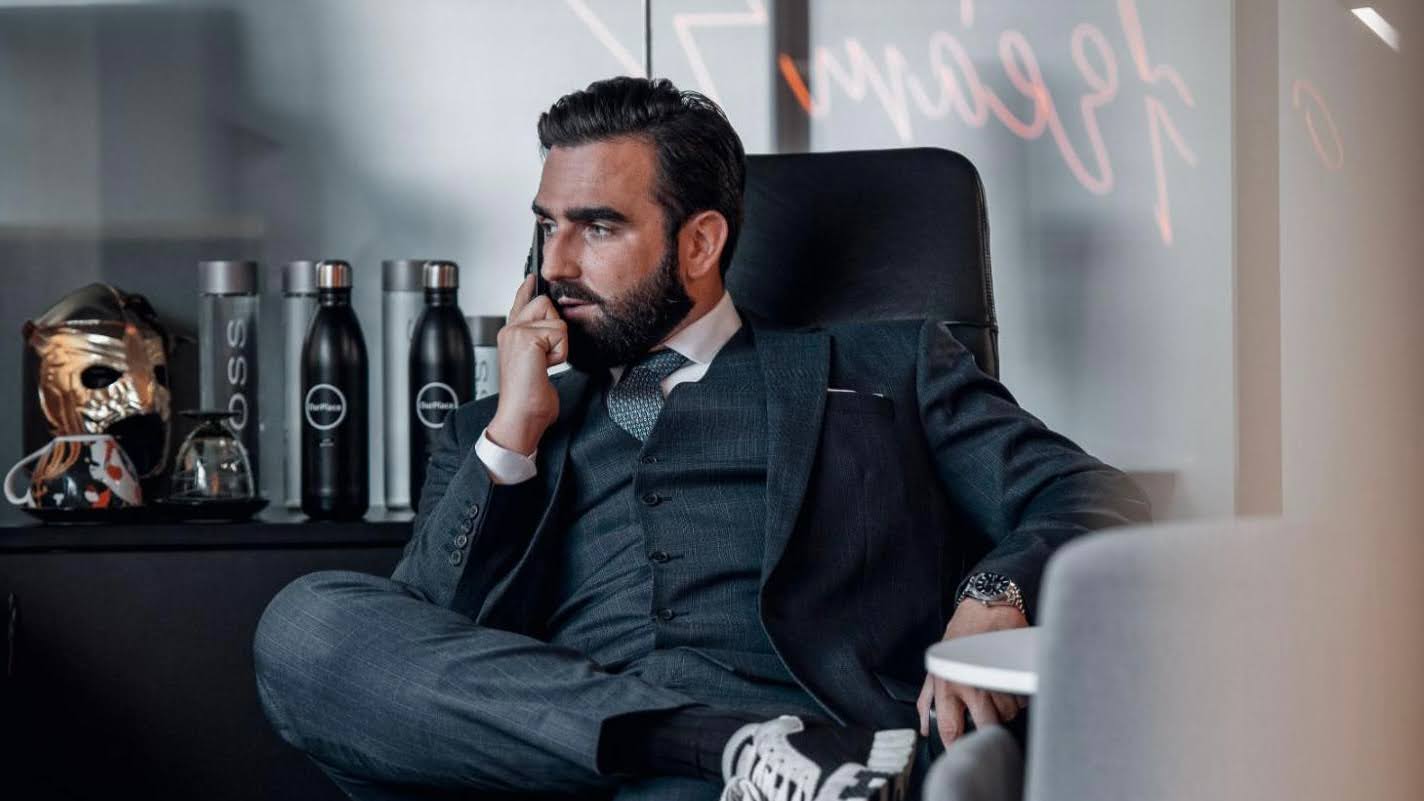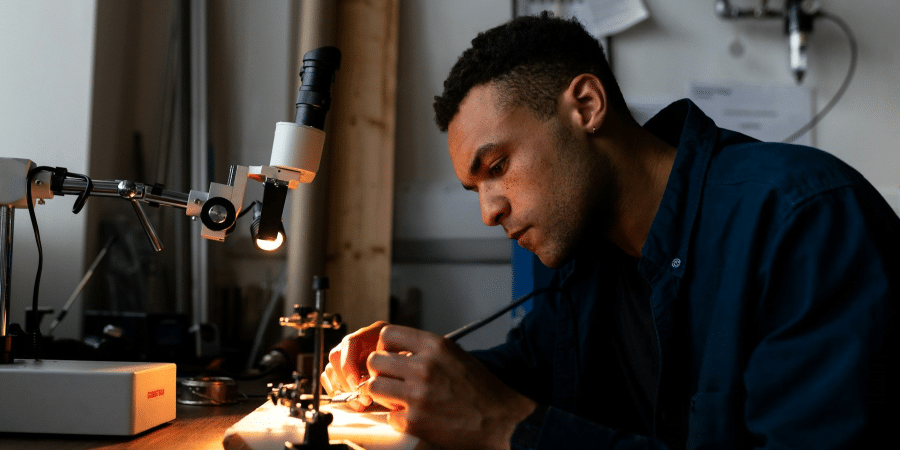Dr. Chambless Johnston from Johnson City, Tennessee, is the founder and CEO of East Tennessee Recovery where he treats people with addiction issues using integrative care. Dr. Johnston was born in Nashville and grew up in Tennessee. He went to East Tennessee State University (ETSU) for his undergraduate degree with a major in Biology and a minor in History. He went to the American University at the Caribbean School of Medicine on St. Maarten, a beautiful island in the Caribbean, and graduated in 2002. He did his internal medicine residency at East Tennessee State University and then began practicing internal medicine in 2006. In his work as a hospitalist, he encountered many patients that had addiction issues and he really wanted to provide more options for them.
Chambless Johnston created East Tennessee Recovery to get away from the cookie-cutter approach to addiction treatment that often resulted in patient relapse. The practice provides a more comprehensive, individualized treatment because addiction is a lifelong disease that needs continued treatment. East Tennessee Recovery’s integrative model is changing the industry. Patients are treated for their addiction needs, mental health needs, and primary care needs like diabetes, high blood pressure, and COPD.
East Tennessee Recovery uses an individualized plan that treats the whole person. Patients tend to stay longer, instead of relapsing and going from place to place. When Dr. Johnston first got started, he was focused on clinical care for patients, but now as East Tennessee Recovery has grown, he is more involved in the planning, direction, and coordination of the day-to-day operations.
How did you get started in this business?
I thought my calling was to become a doctor, but now that my work has become helping people with lifestyle changes, I am the happiest that I have ever been. Doing this kind of work inspires me. While I was working in the hospital, I really saw the need to help people with addiction issues and I felt like it was not done at the most effective level. We started out by opening a small clinic. Because of how hard we have worked and our success with patients, we have grown to four facilities in two states. I have a goal of adding 11 more in the upcoming year and having 15 clinics for our patients.
At East Tennessee Recovery, we evaluate the whole patient. We talk with the patient, and it is a give-and-take relationship. We encourage them to stay clean and become a better person while in our program and in that way, we can change our community.
Most doctors that handle addiction treatment have a psychiatry background, but since we treat the whole patient, not just the addiction issues, we do not limit the doctors we hire to those with psychiatry backgrounds and hire the best doctors that we know.
A lot of these patients cannot afford treatment. When I was working in the hospital, I saw that most of the addiction treatment was done on a self-pay basis. They were often treated as if their addiction was a moral failing, rather than a true chronic brain disease like we know it is now. We have been able to now convince some of the insurance companies in Tennessee and Virginia to understand that if we take care of this now, it will save a lot more money in the long run. East Tennessee Recovery was the first facility to take insurance as an office-based opioid treatment center (OBOT) in Tennessee and Virginia. We have been leading the way on that.
How do you make a profit?
I learned this early on in my medical career. We want to do everything for free. We want to see our patients for free, but if you cannot make enough money to pay your bills as a business or a practice, you can’t take care of the patients. Our success comes through the services we provide our patients. We have a very effective and efficient system to treat patients with addiction. We have doctors managing these patients. We have case management for resources. We have individual counseling and group therapy for the mental health aspect. We also provide primary care which sets us apart from other clinics. We have contracts with insurance companies to pay for our services. It is very hard and very difficult, but we continue to grow with the insurance companies, and we want to work effectively with them to provide the best care for these patients. As we increase our value as a company and increase the value of how we take care of our patients, it increases our reimbursement with the insurance companies.
How long did it take for you to become profitable and was there ever a time you doubted it would work? If so, how did you deal with that?
It took almost two years to become profitable. When we first started, we had self-pay, but ultimately, I chose to work with insurance companies. I definitely believed in what we were doing and the system we had developed. We started with a good base of patients and learned what we needed to do. We learned how to become profitable over time. We continue to refine our system and how we take care of our patients by adding more services to help them.
I do remember one day that I came in and looked at our profit and loss statement and saw how much I needed to pay to our staff and the little amount that we had in the bank, and that was a day I had some doubts. But I have always been a very positive person and I try not to let doubts creep in. I walked out to the mailbox and said a prayer asking for help as I went. I literally pulled out a check from one of the insurance companies that provided just what I needed to make payroll.
How did you obtain your first customer?
My first customer was a patient who had gone to the hospital and had some difficulties with some other issues related to their addiction. I think one of the nurses that I knew gave the patient our card and said, “You might want to call this guy.” The patient contemplated going in for treatment and called that Friday at 7:30 at night. We gave him our time and we talked to him. I remember the patient saying, “If you didn’t come here tonight, I don’t know if I would have made it. I might have died.” That patient is still with us and doing great.
Our best marketing is done by our patients. You can see their recoveries. I take good care of them, and they refer others to us like crazy. You have to listen to them and find out their needs. We are still small and different from others because we take the time to listen. When you listen to your patients, they tell you what you need to do to help them. That is what I’ve always done, and I think that is our best marketing strategy. We do social media, but I think our best marketing is what we do for our patients.
What is the toughest decision you’ve had to make in the last few months?
I had to let a personal friend go from the business. As much as I hated it, for us as a company, we had to do it to grow. I always want to give people a chance. We give our patients chances. We continue to give new employees a chance. The hard part is when you know it’s not working out and you can’t let it linger on and you have to let that person know you are sorry it didn’t work out and they just weren’t ready for the position. You can still be positive about it. I feel like it is a disservice to them as well our business if we don’t let them know. Growing for the last few years in our business, I have learned as a business owner the skill of knowing when it is time. We want to give people a way to improve their lives, but if it is just not working out, you just have to let them know.
What has been your most satisfying moment in business?
It was very satisfying how much we were able to help our first patient and that continues to inspire me to keep building this practice. It’s also so satisfying to me to see our patients that are thriving now. I tell many people that our patients are our heroes. Ultimately the care we give them defines who I am. It’s very satisfying to see a patient six to eight months later that has completely regained their life back. I often wish I could take a picture on the first day in treatment and then a picture of their future in six months from then and what they are going to look like. It is very life-changing. There are many satisfying moments but seeing that patient on the first day and then that smile on their face when they quit using drugs and they have regained their life, gotten their kids back, they have a job, and they have enough money in their pocket to buy gifts for their kids at Christmas- that is really satisfying.
What are you most excited about in the future of your business?
I really want to expand. My goal is to get as many people as possible with addiction issues to access treatment. That is why I started this. Working with the insurance companies so they can help these patients get their addiction treatment paid for has been huge. I want to be in many states. I want to rapidly expand while still giving this same level of care. Starting in 2021 we already have two to three other places lined up that we most likely are going to move into. We are meeting and making connections with a lot of people in other states, and I think we will be able to help show them a way to give more people access to the kind of care that we provide. Furthermore, I think it is also important to note that we are working with other facilities related to addiction treatment. The goal in doing so is to educate people and communities about addiction treatment and work collaboratively for a continuum of care. That overarching structure of care is a very exciting prospect in the future of my facility.
Are you willing to mentor someone looking to get into your field? If so, how should they contact you?
We are mentors for people. One of the really cool things we did when we first started East Tennessee Recovery is we reached out to the East Tennessee State University Social Work program. We needed good counselors and social workers to work with us to help these patients get more resources.
We started with their intern program in east Tennessee and southwest Virginia to teach interns about what we do and to help them expand their knowledge about the counseling and social work opportunities in the area. Tulane also sends us people. Milligan College and King University also want to send us interns. We were one of the first in East Tennessee to take on internal medicine residents and training them in addiction treatment.
We also teach our patients to mentor other patients that come in. We encourage them to come to groups and find somebody and be a mentor to them.







